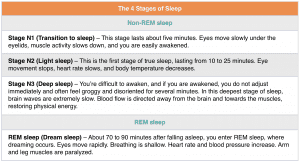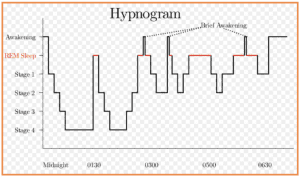When people wish you a good night sleep, does it come true?
The offering of a ‘good night sleep’ wish to someone is something that happens almost reflexly as a day comes to its end. I am sure that at some point in time it has been a regular phrase in almost everyone’s vocabulary, but how often does it come true? What exactly constitutes a good night sleep?
Despite the fact about one third of our lives are spent sleeping, quality sleep is often overlooked by people when they are assessing their health or the health of others. Let’s have a look at what in fact constitutes a ‘good night sleep’.
What is Sleep? – The Physiology of Sleeping
Sleep is controlled by your circadian rhythm which is an internal mechanism that controls your intuitive time keeping, temperature changes and metabolic fluctuations. Your circadian rhythm is regulated by various brain processes and is influenced by the amount of hours you have spent awake and also changes between light and dark. At certain stages of a persons circadian clock, hormones are released which begin to slow down the physiological processes associated with wakefulness. The main hormone involved is melatonin which begins secreting at approximately 9.00pm and stops at around 7.30am. For most people the deepest sleep period occurs at approximately 2am.
Melatonin is a naturally occurring hormone that helps regulate your sleep-wake cycle and its production is governed by light exposure. In a healthy individual the brain should secrete more in the evening when it is dark, making you feel sleepy. During the day when you are exposed to light, production is decreased helping you stay awake and alert. However, many aspects of modern life can disrupt your body’s natural production of melatonin and with it your sleep-wake cycle. Most commonly these are not enough exposure to daylight and too much TV or artificial light exposure at night time.
Getting enough sleep is extremely important as a ‘good night’ of sleep accentuates the growth and rejuvenation of the immune, nervous, skeletal and muscular systems and improves cognitive function and memory processing.
Traditionally when it comes to assessing sleep patterns a lot of attention is directed at the amount of sleep (hours) one is getting. However research has shown that if a person’s major sleep episode is not in line with their normal circadian rhythms it doesn’t matter how long it is, it will be inadequate and inefficient. In other words, it’s when you sleep that is more important, rather than how many hours you get!!
For optimal function we do require a certain level of sleep, so if we are heading to bed in line with our circadian rhythm, how much sleep is recommended?
Based on the available evidence the most common recommendations for sleeping hour needs are listed in the table below.
Once the eyes are closed….
Sleep can be broken down into 4 main main stages which get categorised as either REM (which stands for Rapid Eye Movement) or NREM (non-rapid eye movement). The stages of sleep and a brief summary of the purpose of each is listed below.
Throughout the night you travel through all four stages with one full cycle lasting approximately 90 minutes. Most people go through approximately 4-5 cycles of sleep each night with the amount of time spent in REM increasing in length with each cycle. It is a good idea to gain some awareness of how long your sleep cycles lasts and when your circadian rhythm is. This will allow you to start your day at the end of a sleep cycle and you won’t be tortured by the alarm clock whilst you are in the deeper stages of sleep. A visual depiction of an average night of sleep cycles can be seen in the graph below.
What are the consequences if you don’t have a ‘good night sleep’?
Sleep deprivation can negatively impact on the function of the body in many ways, many of which most people don’t attribute to poor sleep. Some of the effects of lack of sleep are listed below.
- Feelings of fatigue, lethargy, and lack of motivation
- Moodiness and irritability
- Reduced creativity and problem-solving skills
- Decreased ability to cope with stress
- Reduced immune function; frequent colds and infections
- Problems with concentration and memory
- Susceptibility to weight gain
- Impaired motor skills and increased risk of accidents
- Difficulty making decisions
- Increased risk of diabetes, heart disease, and other health problems
Now that you know what a ‘good night sleep’ means the next time some one wishes you one, you will be able to tell if it comes true or not!
In the coming weeks I will be posting the second part to this blog in which I will give you some strategies to ensure you get a good nights sleep every night. In the mean time, if you have any questions you can contact us at info@mychiropractic.com.au
Written by Dr Marcus Yeo







Leave a comment
You must be logged in to post a comment.